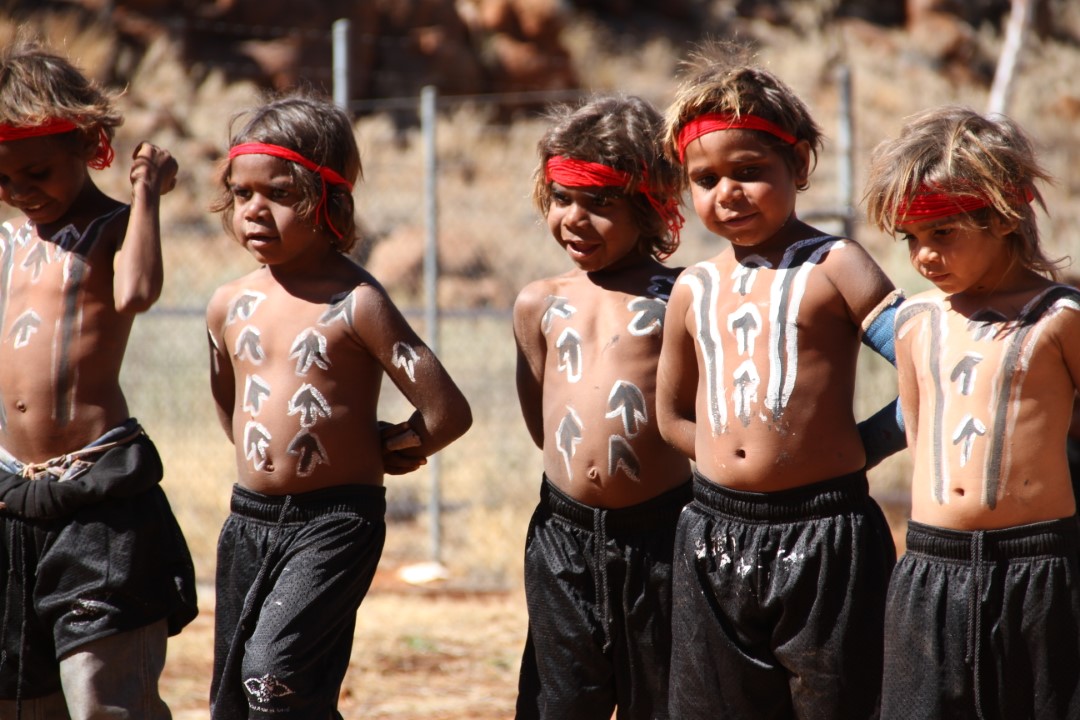In past years, Carclew has played a lead role to facilitate teaching and recording of Pitjantjatjara and Yankunytjatjara Inma and languages across the APY Lands, through the Tjitjiku Inma project and the creation of a trilingual learning resource.
In partnership with Lee-Ann Buckskin & Associates, Carclew is proud to present the Tjitjiku Tjukurpa online learning resource!
Under the guidance of cultural custodians, Tjitjiku Tjukurpa has focused on working with children from Amata, Pukatja and Mimili Communities to teach and record ancient Inma in Pitjantjatjara and Yankunytjatjara languages, through exploration into the Seven Sisters Dreaming from this region.
Thirty-four Anangu young people undertook an 8-day journey in June 2019, tracking the Seven Sisters Songline from Iron Knob through to Atila and ending at the sacred Cave Hill site near Amata.
Along the way, stops were made to learn Inma – song, dance and walka – from significant cultural custodians. A key outcome has been the development of a digital resource, which aims to better assist community and educators in teaching Aboriginal content in the classroom. The digital resource launched on Friday the 23rd of September 2022 at opening night of “Tutu Karralikanungku“.
Following the journey, children participated in workshops that devised contemporary reimaginings of the Seven Sisters Dreaming. With Amata focusing on Inma dance with Tapaya Edwards and Rhoda Tjitayi; Mimili on Inma song with Electric Fields’ Zaachariaha Fielding and Pukatja on claymation animations with animator Jonathan Daw. Project outcomes will be presented in in 2022.
Tjitjiku Tjukurpa has involved 4 key projects:
The Excursion – 16-23 June 2019
The project kicked-off with a group of thirty-four children from associated communities undertaking an 8-day journey, tracking the Seven Sisters Songline from Iron Knob through to Atila and ending at the sacred Cave Hill site. Along the way, stops were made to learn relatable inma–song, dance and walka from significant cultural custodians. A key outcome of this deliverable is the development of a digital resource, which aims to better assist educators in teaching specific Aboriginal content in the classroom.
Amata Residency – Term 1 and 4 2019
During the Amata residencies children learnt about ancient Inma and Walka of the Seven Sisters Dreaming. Inma is the ceremonial song and dance that accompanies the Tjukurpa (Dreaming stories), and Walka, the body paint and designs. Children also learnt the ancient art of Punu (traditional wood work) with renowned artist, Mary Pan. It is vital for the next generations to learn these art forms to ensure this ancient knowledge is not lost. The Inma, Walka and Punu residency at Amata was supported by Country Arts SA’s Step Out Grant – Regional Arts Fund.
Pukatja (Ernabella) Residency – Term 3 2019
The Pukatja residency saw children working with claymation artist Jonathan Daw, to recreate the Seven Sisters Tjukurpa into contemporary children’s animations. Students took these ancient stories and have transformed parts of them into two visual Claymations of their imagining.
Mimili Residency – Term 4 2019
This residency saw Mimili School students working with contemporary music duo, Electric Fields, to transform ancient Inma songs into modern contemporary music tracks. The students worked with Electric Fields during a one week residency to workshop and record the Inma songs with Elders.
The various communities and artists involved in Tjitjiku Tjukurpa were set to come together in 2021 for a community celebration in Amata, including a screening of the digital resource and Claymation videos, Inma performances by the children from Amata and a presentation of the contemporary song/s created by Mimili children and Electric Fields. Unfortunately, this event was postponed and later cancelled due to Covid 19 concerns for the APY communities.
To ensure the Tjukurpa and project lives on, and is accessible for students to come, the projects contents have been produced into an educational and interactive website that teachers can use in the classroom.
If you or your organisation is interested in supporting high quality creative experiences for Aboriginal children and remote communities, we welcome you to get in touch to discuss further.
Banner image: Four boys with body paint
